Wondering whether BCAAs or whey protein will help you build more muscle? You’re not alone.
It’s one of the most common questions I get from clients — especially those who want real results, not hype.
As a fitness coach who’s tested both on myself and dozens of clients, I’ve seen firsthand what works — and what’s just clever marketing.
In this article, I’ll break down the real difference between BCAAs and whey protein for muscle growth, backed by years of coaching experience, real-world transformations, and a no-BS approach to supplements.
Table of contents
Quick Answer: Which One’s Better for Muscle Building?
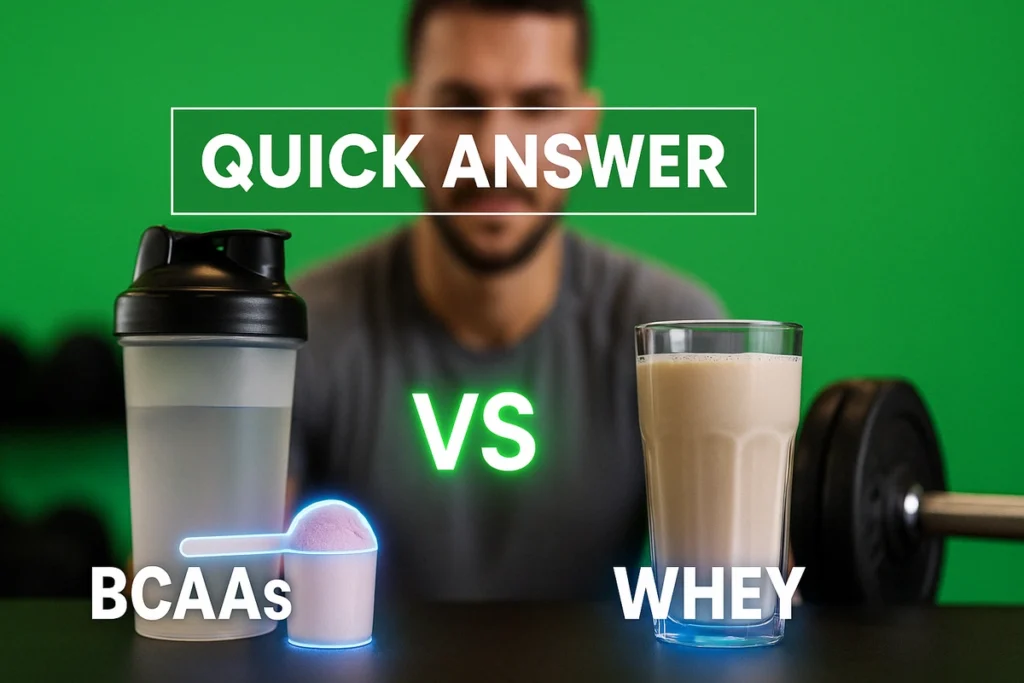
Let’s cut to the chase — if your goal is to build muscle, whey protein is the clear winner.
Whey is a complete protein loaded with all the essential amino acids your muscles need — including BCAAs. It not only stimulates muscle protein synthesis (MPS) but also gives your body the full building blocks to actually grow new muscle.
That said, BCAAs still have their place — especially in fasted training, low-protein diets, or when you’re deep in a cutting phase. But they’re not a replacement for real, complete protein like whey.
As someone who’s coached clients for years — and been through every bulk, cut, and plateau myself — I’ll walk you through what works in real life, not just theory.
What Are BCAAs and How Do They Work?
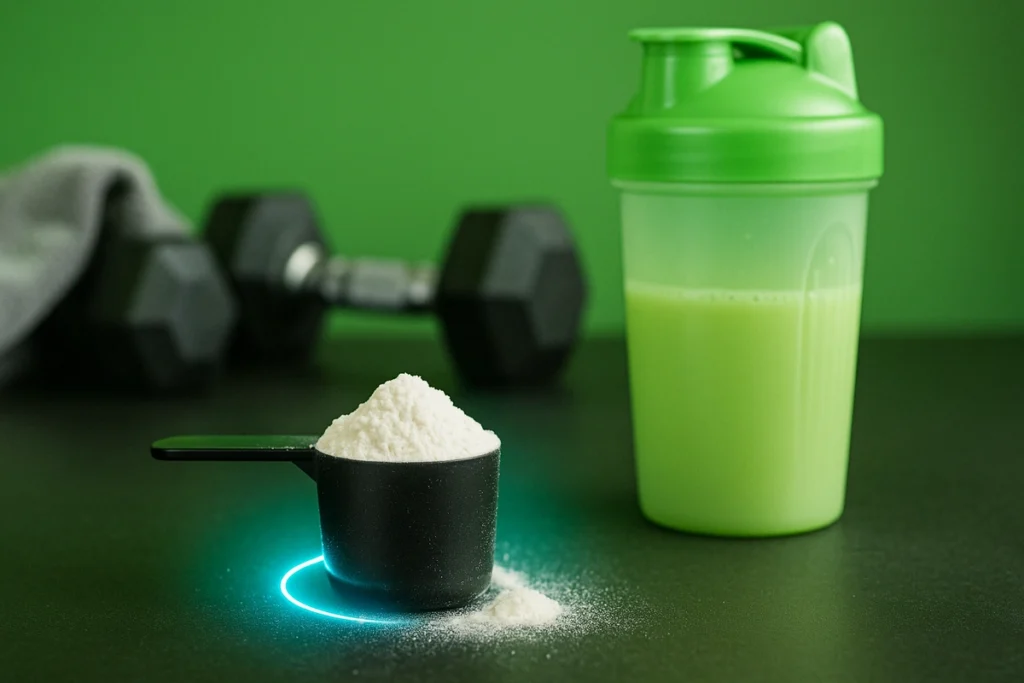
BCAAs — short for Branched-Chain Amino Acids — include Leucine, Isoleucine, and Valine. These three aminos are directly involved in muscle recovery and energy production during training.
They’re unique because they skip liver processing and go straight to your muscles. That’s why some athletes sip BCAAs during fasted workouts — for a quick fuel boost without breaking the fast.
If your main reason for using BCAAs is to bounce back quicker after training, you’ll want to check out my full breakdown on how BCAAs help reduce muscle soreness. It dives into real research and firsthand coaching experience around BCAAs’ recovery benefits, especially after heavy or eccentric workouts.
👉 Real Story:
When I was in a cutting phase while intermittent fasting, I’d take BCAAs before morning workouts. It helped me train harder without feeling completely drained.
What’s in Whey Protein?
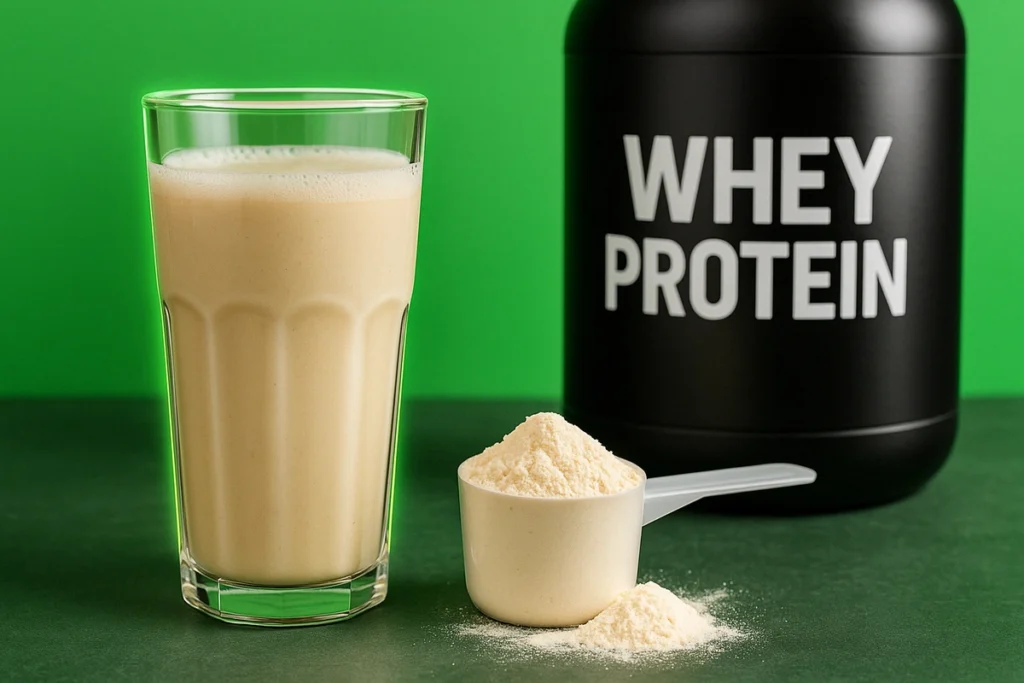
Whey protein is a complete, fast-digesting protein derived from milk. It contains all 9 essential amino acids, including BCAAs.
Besides fueling muscle growth, whey helps with:
- Faster recovery
- Improved strength gains
- Keeping you full longer — helpful when cutting
- Supporting immune function
👉 Real Story:
I’ve been using whey for over 10 years — and it’s still a staple in my routine. I recommend it to 90% of my clients, especially those who struggle to hit daily protein targets with whole foods alone.
If you’re serious about maximizing results, don’t miss my expert guide on the best whey protein for muscle gain and recovery. It includes my personal recommendations, favorite brands, and how to get the most out of each scoop — especially post-workout.
BCAAs vs Whey – Muscle Growth Comparison
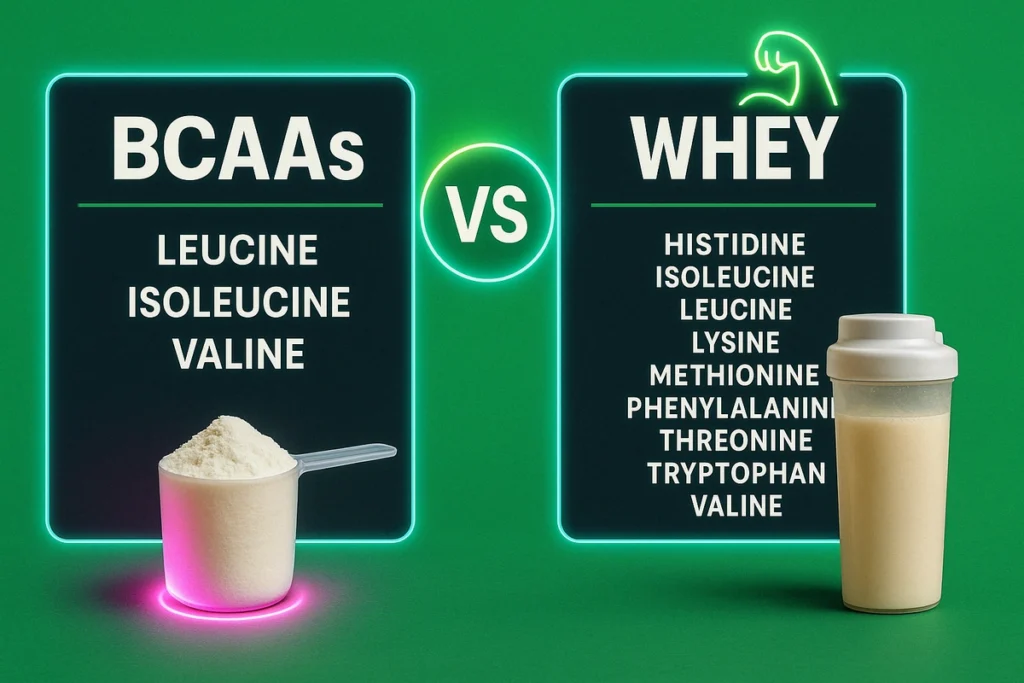
Here’s the thing: Leucine triggers muscle protein synthesis — but without all essential amino acids, your body can’t complete the muscle-building process.
Whey doesn’t just trigger MPS — it fuels it from start to finish. BCAAs alone might start the engine, but without the rest of the aminos, there’s nothing to build with.
👉 Client Story:
David (Canada), one of my online coaching clients, hit a plateau despite eating clean. Once we added 30g of whey post-workout, he gained 4kg of lean muscle in just 3 months. That kind of result is tough to get from BCAAs alone.
Still deciding whether whey is enough — or if you need creatine too? I covered this in detail in my article on creatine vs whey protein for skinny guys trying to bulk up, where I explain how to stack them for faster gains.
When BCAAs Might Be Helpful

Even though whey is king, BCAAs do have a role in certain cases:
- Fasted workouts – No time to eat before training? BCAAs give quick support.
- Low-calorie diets – Help reduce fatigue and support recovery.
- Vegans/vegetarians – May benefit if full amino acid profiles aren’t met.
- Heavy training or two-a-day workouts
Some lifters also ask whether BCAAs are worth it on days off. If you’re curious, I wrote a guide on whether you should take BCAAs on rest days — with real-world examples of when it’s actually helpful (and when it’s just a waste).
👉 Real Story:
Sara (France), a client prepping for a beach shoot, trained fasted in the mornings. We added BCAAs before workouts to reduce muscle breakdown and keep energy high — it worked.
👉 Another Example:
Emily (Australia) was deep into a calorie deficit and feeling sluggish. BCAAs during training gave her that little edge to power through without burning out.
My Coaching Experience: What I Recommend

Here’s how I usually break it down with my clients:
- Beginners & budget-conscious clients? → Go with whey. It’s versatile and fills real nutritional gaps.
- Fasted training or deep in a cut? → Add BCAAs, but only if the budget allows.
- Already hitting protein targets with whey? → You likely don’t need BCAAs.
👉 Personal Example:
Leo (Brazil), a competitive client, was doing double sessions — cardio in the morning and lifting in the evening. I added intra-workout BCAAs to help him recover between sessions, alongside whey post-workout. The combo worked wonders.
Final Verdict: What Should YOU Take?

So, here’s the honest, no-BS answer:
- Take whey protein if you’re serious about building muscle, recovering faster, and hitting your daily protein goals.
- Use BCAAs only if your situation truly calls for it — like fasted training, cutting hard, or needing extra support during intense fatigue.
And don’t fall for the hype — BCAAs won’t build muscle on their own. But in the right context, they can give you a mental and physical edge.
🎯 Coach’s Final Takeaway
If you’re training hard, fueling properly, and aiming to grow — whey is your best friend.
💬 Still confused about which one fits your routine? Drop a comment — I answer all questions personally, based on your goals.

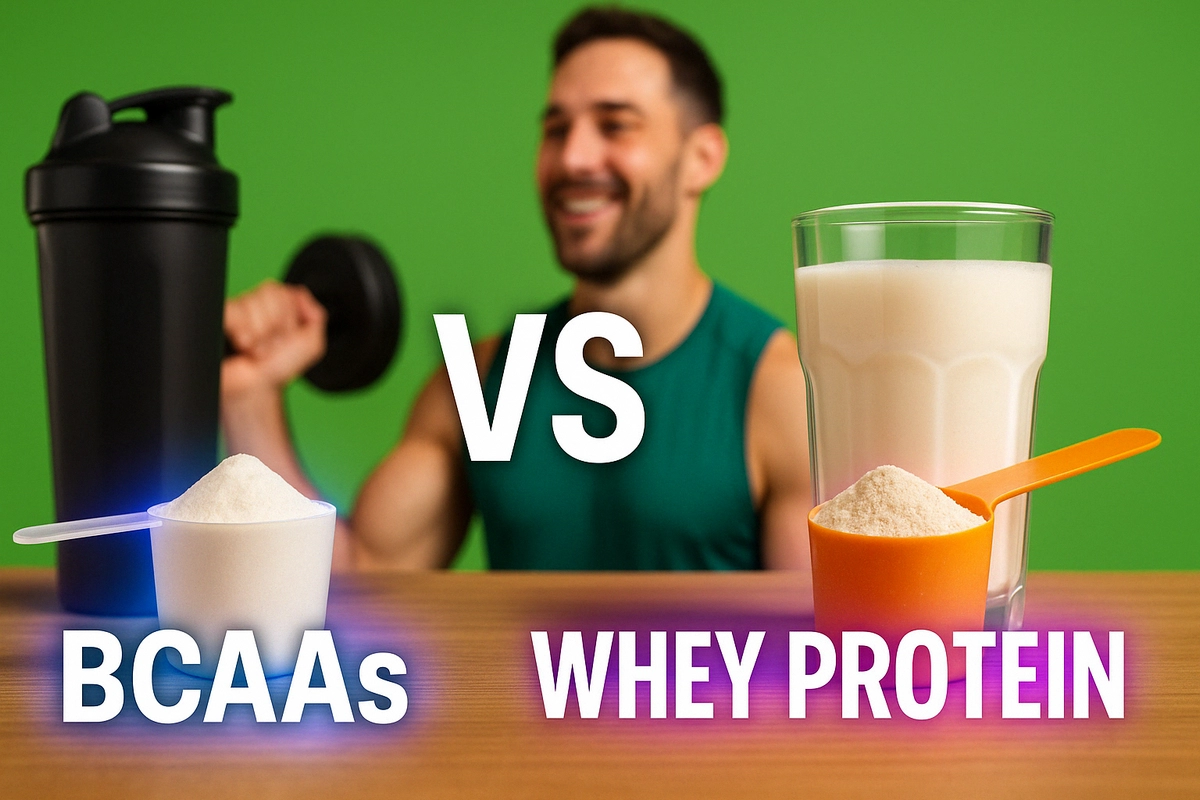

Leave a Reply